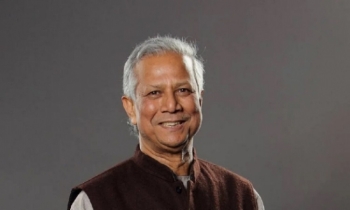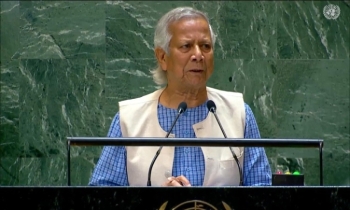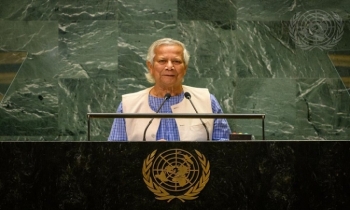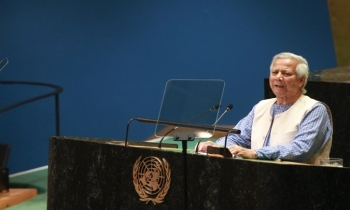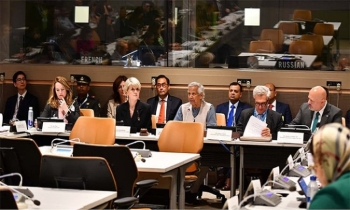Bangladesh at 50: A shining star
BI Special || BusinessInsider

If it is one word, the story of the transformation of Bangladesh is ‘unbelievable’
If it is one word, the story of the transformation of Bangladesh is ‘unbelievable’. We are yet to tell the people about this story. Look at the benchmark. In 1972, the size of Bangladesh’s economy was about $8 billion, per capita income was $93, 82 percent of the population was below poverty line, and 47-year was our life-expectancy.
Today, the economy has grown to about $302 billion in 2019. In 2020, if we estimate 6% growth, it was almost $320 billion. Per capita income has gone above $2,000.
Dr Atiur Rahman, former governor of the Bangladesh Bank and a senior economist who witnessed the birth of Bangladesh as a student and is now celebrating the country’s golden jubilee or 50 years of independence, was telling the stories to the Business Insider Bangladesh recently.
Rahman said foreign exchange reserve was nil, now it is $44 billion. Life-expectancy has grown up to 73 years from 47 years. The pre-pandemic poverty rate was around 20 percent, down from over 80 percent when Bangladesh was born.
Most importantly, the per capita fertility rate went down to two children now from six children 50 years ago. “This is one of the reasons why our per capita income continues to grow,” said the economist.
Bangladesh has also achieved significant improvement in human development over the years. He said early investment on primary education and primary health was very high. Now the country’s position in women empowerment is the best in the region.
“We are doing so well in financial inclusion that 80% to 90% of the population has access to the financial system. And, most of the accounts are active,” said the former BB governor who played a key role in developing financial inclusion.
Mobile financial services and agent banking have brought rural unbanked people into the formal financial system; he said adding that the financial inclusion has helped the country get remittance.
In 1976, the inward remittance was only $16 million, which increased by 1,000 times to $16 billion in 2019 and we are expecting this will go up to $20 billion this year.
Agriculture sector has also witnessed tremendous success, he said. In 1972-73, Bangladesh produced 1 tonne per hectare and now the output has increased to around 5 tonne. In the agriculture index, Bangladesh ranked 145th, which is higher than Vietnam, China, Argentina and India.
“Not only cereal, our agriculture has become diversified and modern, including poultry, fishery, livestock and horticulture. It’s a mind boggling story,” said Rahman.
 About the climate challenge, the economist said Bangladesh is doing far better than many countries. “Our prime minister is leading the world in terms of climate vulnerability forum. Bangladesh’s delta plan has been taken to address climate change. Our perspective plan is also considering the environment, climate change and so on,” said Rahman.
About the climate challenge, the economist said Bangladesh is doing far better than many countries. “Our prime minister is leading the world in terms of climate vulnerability forum. Bangladesh’s delta plan has been taken to address climate change. Our perspective plan is also considering the environment, climate change and so on,” said Rahman.
Yet, there is nothing to be complacent, says the economist.
“Still, we have many challenges. One of the big challenges is employment,” he commented.
The youth have degrees and education, but they are low paid. This means the country lags behind in knowledge economy, he said. Bangladesh’s higher education index is poor and the reason may be the education system was expanded without teacher’s quality.
“We need to focus on teacher’s quality, laboratories, right technology and governance. Employers are not accepting the graduates we are producing,” he said.
According to Rahman, the third challenge Bangladesh is facing is infrastructure deficit. He also questioned the quality infrastructure. Due to the covid-19 pandemic, maintenance of infrastructure works was disrupted in 33 districts.
He however said the government has taken a smart move - mega projects – to improve the situation. “Once the mega projects are completed, there will be huge improvement in infrastructure, particularly, with the Padma Bridge,” he said.
Once the Padma Bridge is completed, the southern part of Bangladesh, which is vulnerable to climate change, will be integrated with the main economy and people will find employment, he said. Only Padma Bridge will add 1 percentage point to the GDP. Bangabandhu Industrial City in Mirsarai, once completed, will add another 2% to the GDP, he said.
But to him, these infrastructure projects along with forward and backward linkage activities need to be completed timely.
Covid-19 pandemic threatens to erase gains:
The ongoing coronavirus pandemic for a year has posed a big challenge to Bangladesh as some of the achievements that we have gained over the last 20 years are a threat to be washed away.
Quoting a BIDS survey he said around 1 million new poor have been created due to the Covid-19 pandemic. Almost 57 percent of the people who used to earn Tk 11,000 per month have either lost their jobs or their income got reduced, he said. Many of the people who had earned around Tk 30,000 have lost their jobs and another 39 percent experienced a reduced income, he added.
People who worked in the informal sector were the most affected; he said adding that about 6 percent people left the urban areas during the lockdown.
“One of the advantages of Bangladesh is its vibrant rural economy that has the capacity to absorb the shocks. It is the best thing that has happened in Bangladesh over the years,” said the former central bank governor.
“I still hope Bangladesh is doing better than many countries during the pandemic. But we need to keep in mind that overall demand has not yet recovered,” said Rahman.
He went on to say the stimulus packages were the very smart move from the government to support the affected industries, including garment. But the worried thing is that external demand might be affected due to the second wave of Covid-19 in Europe.
Stimulus packages should be extended up to June 30 for recovering the small and medium enterprises and the benefits should be given to those who can utilise it, he said.


